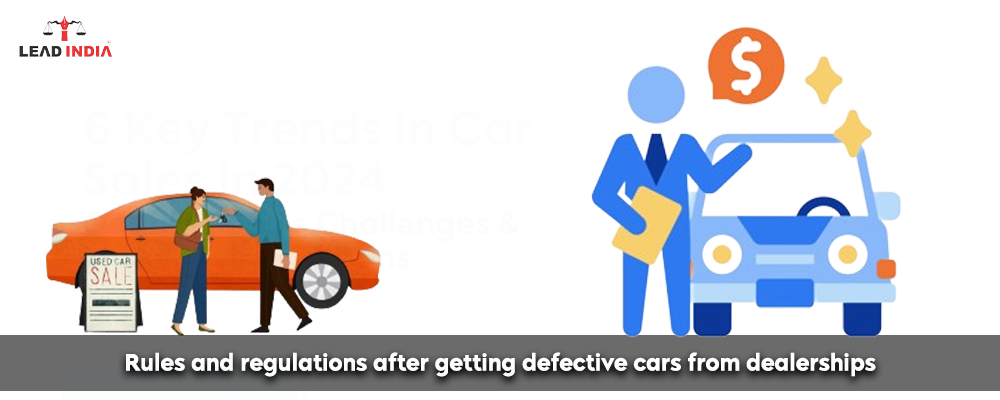Car dealerships have established regulations and processes that govern the sales process. These principles govern how businesses contact and communicate with prospective consumers, negotiate rates, and manage trade-ins. Car dealerships must also comply with state and federal rules governing vehicle sales.
One of the most frequent pricing strategies is the “no-haggle” pricing strategy, which states that the dealership does not negotiate rates with clients. This strategy is becoming more common in the car dealership sector since it simplifies the purchasing process and decreases the likelihood of disagreements between the buyer and the dealership.
Product liability is a vast topic of law that includes motor vehicle faults. Products made or sold in the United States must be safe and appropriate for their intended use. Purchasing a car should be safe, with all parts working as expected. If not, you have a defective automobile.
Need A Legal Advice
The internet is not a lawyer and neither are you. Talk to a real lawyer about your legal issue

Product faults fall into three broad categories
- Design flaws: These are found on the drafting table. Something about the product’s design makes it inherently unsafe or unusable.
- Defects in manufacturing: A defect arises during the manufacturing process or assembly.
- Defects in Marketing: This category includes inadequate labeling, insufficient warnings, or inappropriate use instructions.
Requirements and Standards under the Consumer Protection Act
According to Section 56(2) of the Consumer Protection Act 68 of 2008 (“CPA”), if goods fail to meet the requirements and standards contemplated in Section 55, a consumer may return them to the supplier without penalty and at the supplier’s risk and expense within six months of delivery.
The consumer may then request that the supplier repair or replace the failed, unsafe, or faulty items, or refund the purchase price. If there is evidence of a CPA violation, the consumer has complete control over this decision. Section 56(2) does not require the consumer to offer the supplier the opportunity to inspect or repair the vehicle.
It is also irrelevant whether the fault was patent or latent (not easily detectable by a reasonable inspection of the item being sold) before and during delivery of the goods.
Section 55 of the CPA gives consumers the right to goods that are fairly appropriate for their intended use, of outstanding quality, and in good working order, and free of defects, and that are usable and durable for a reasonable amount of time.
Section 56 of the CPA contains an implied provision that the provider warrants that the items supplied meet the requirements and standards outlined in section 55. These CPA regulations apply to the purchase of a vehicle from a dealership or supplier.
Rules and regulations after getting defective cars
- Breaches of the CPA: If the car you purchased is defective and does not meet the standards outlined in Section 55 of the CPA, the provider violates the CPA’s regulations. In this situation, you may return the vehicle to the supplier without penalty and at the supplier’s risk and expense within six (6) months of delivery. You may then request that the supplier fix or replace the car, or refund your purchase price. However, you should evaluate whether the vehicle was utilized after you became aware of the issue. The period between becoming aware of the issue and returning it to the dealer or alerting them that it needs to be repaired or refunded may result in the dealer not giving you with a complete refund, which is understandable. This will be determined by the specifics of the situation and may vary from instance to case.
- Breach of Sale Agreement: Under certain circumstances, your sale agreement may include specific warranties issued by the seller, such as the car being free of flaws and having not been in an accident. If you later discover that there are problems or that the car was involved in an accident, you can also sue for breach of the sale agreement.
- Fraudulent misrepresentation: If the seller was aware of the flaw but omitted to disclose it to you, you may hold the seller accountable for fraudulent misrepresentation. You, as the purchaser, must demonstrate that the fault existed at the time of the contract of sale and that the seller purposefully hid it. If you can successfully demonstrate this, you can either a) seek monetary damages (to repair the faults), b) cancel the sale and seek a refund of the purchase price plus interest, or c) seek a price reduction
Lead India provides free legal advice, internet information, and other legal services. We offer a forum where you may talk with a lawyer and ask legal questions. Lead India’s Lawyers may assist you with any legal matters. Lead India’s solicitors can help you with any legal concerns. Lead India also offers free online legal help in India. In addition to providing online legal aid, Lead India allows users to ask specialist inquiries for free.





 Talk to a Lawyer
Talk to a Lawyer